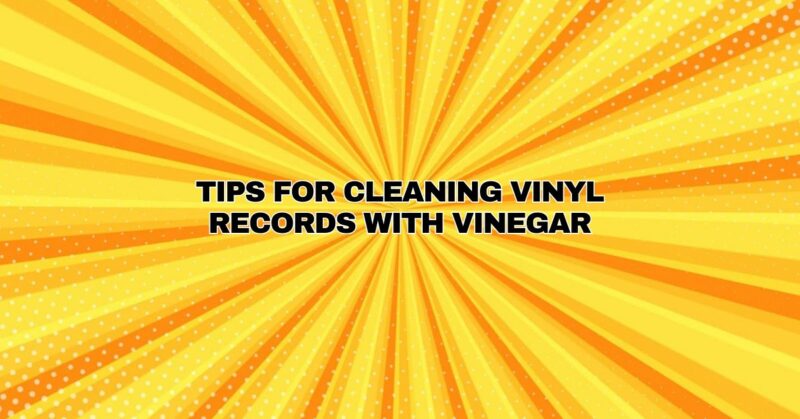Vinyl records, celebrated for their analog warmth and timeless appeal, continue to capture the hearts of music enthusiasts and audiophiles alike. Proper care and maintenance are essential to keep your vinyl collection in pristine condition and preserve the high-quality sound they offer. Cleaning vinyl records with vinegar has become a popular and cost-effective method for audiophiles looking to enhance their listening experience. In this comprehensive guide, we will provide you with expert tips and insights on how to effectively clean vinyl records with vinegar, ensuring that your cherished analog treasures continue to sound their best.
Why Clean Vinyl Records with Vinegar?
Cleaning your vinyl records with vinegar offers several advantages:
- Dust and Debris Removal: Over time, vinyl records can accumulate dust, dirt, and microscopic particles that compromise sound quality. Vinegar effectively removes these contaminants, restoring clarity and fidelity to your records.
- Cost-Effective Solution: Vinegar is an affordable household item, making it an accessible and budget-friendly cleaning solution for vinyl enthusiasts.
- Safe and Non-Abrasive: When properly diluted, vinegar is gentle on vinyl records and does not pose a risk of scratching or damaging the grooves.
Materials Needed for Cleaning with Vinegar
Before embarking on the vinyl cleaning process, gather the following materials:
- White Distilled Vinegar: Ensure that the vinegar you use is free from additives or colorings. This type of vinegar is widely available at grocery stores.
- Distilled Water: Distilled water is recommended because it lacks impurities and minerals that can leave residue on the record.
- Spray Bottle: A spray bottle with a fine mist setting ensures even distribution of the cleaning solution.
- Soft Brush: A soft-bristle brush, such as a paintbrush or makeup brush, is used for gentle scrubbing.
- Microfiber Cloth: This cloth is essential for wiping away moisture and contaminants.
- Cleaning Solution Mixing Container: A clean container is required for mixing the vinegar and water solution.
Expert Tips for Cleaning Vinyl Records with Vinegar
Follow these expert tips for a successful vinyl cleaning process using vinegar:
- Dilute Vinegar Appropriately: The vinegar and water solution should be mixed in a ratio of one part white distilled vinegar to three parts distilled water. This dilution reduces the acidity of the vinegar, making it safe for vinyl records.
- Handle Records with Care: Always hold vinyl records by their edges to prevent fingerprints and oils from transferring to the surface.
- Avoid Label Contact: When applying the cleaning solution, be cautious not to let it come into contact with the record label, as this can cause damage or fading.
- Mist Gently: When misting the record, ensure that the application is even but not excessive. Too much moisture can potentially damage the label or affect sound quality.
- Use a Gentle Brush: Employ a soft-bristle brush for scrubbing. Avoid abrasive materials or excessive pressure, as these can scratch the record.
- Wipe Thoroughly: After scrubbing, use a microfiber cloth to wipe away all remaining moisture and contaminants. Ensure that the record is completely dry before playing it or storing it.
- Test on Less Valuable Records: If you’re new to cleaning records with vinegar, consider testing the solution on a less valuable record first to familiarize yourself with the process and to ensure compatibility.
Additional Considerations
- For stubborn stains or deeply embedded contaminants, consider using a specialized record cleaning machine, which provides a thorough and efficient cleaning solution.
- Always store your vinyl records vertically in a cool, dry, and stable environment, away from direct sunlight and extreme temperatures, to prevent damage and warping.
- Regularly clean your stylus (turntable needle) to prevent dust and debris from transferring to your records during playback.
Conclusion
Cleaning vinyl records with vinegar is a cost-effective and efficient method to maintain your vinyl collection. With these expert tips, you can confidently embark on the vinyl cleaning process, ensuring that your records not only look immaculate but also sound as good as the day they were pressed. By following recommended procedures and treating your vinyl records with care, you can continue to enjoy the analog warmth and pristine sound that vinyl enthusiasts cherish for years to come.


